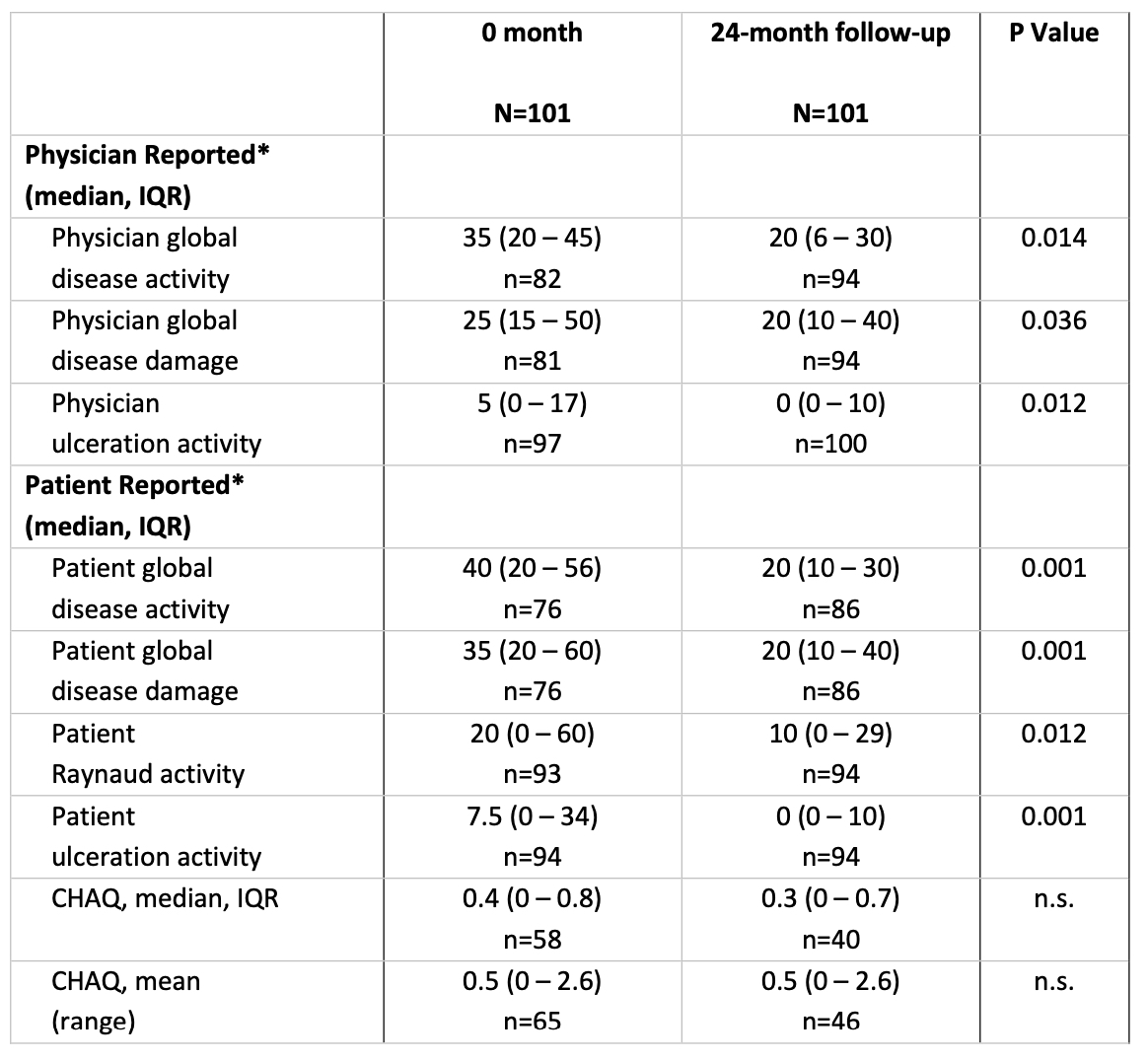Session Information
Session Type: Poster Session C
Session Time: 10:30AM-12:30PM
Background/Purpose: Juvenile systemic sclerosis (jSSc) is an orphan disease with a prevalence of 3 in 1 000 000 children. The Juvenile Systemic Scleroderma Inception cohort (jSScC) is the largest cohort of jSSc patients in the world. The jSScC collects longitudinal data prospectively in jSSc, allowing the evaluation of the development of organ involvement and patients and physician reported outcomes in jSSc over time.
Methods: The jSScC enrols jSSc patients who developed the first non-Raynaud ́s symptom before the age of 16 years and are under the age of 18 years at the time of inclusion (1, 2). We reviewed jSScC patient clinical data and patient and physician reported outcomes of those with 24 months follow up from the time of inclusion until 1st of April 2024.
Results: We could enrol 101 patients with 24 months follow up. 76% of them had diffuse subtype and 82% of them were Caucasian. Median age of onset of Raynaud´s was 9.6 years and median age at the first non-Raynaud was 10.1 years. 31% of the patients were anti-scl70 positive and 3% anti-centromere positive. The Modified Rodnan Skin Score decreased from 12 to 7.5 (p=0.023). The number of patients with active ulceration remained in the same range 20% at time point “0 “and 18% after 24 months . The number of patients with FVC< 80% increased for 36% to 44% and DLCO< 80% from 49% to 50%, both changes were not significant. The cardiac involvement stayed stable at 3% of the patients. The number of patients with pulmonary hypertension increased 5% to 7% (non-significant). The number of patients with 6 Minute Walk Distance (6MWT) less then 10th percentile decreased significantly from 71% to 57% (p=0.047). No patient developed renal crisis and only 1 patient developed hypertension. The gastrointestinal involvement stayed in the same range with 43% at time point “0” and 37% after 24 months. The number of patients with muscle weakness significantly decreased from 16% to 5% (p=0.019) otherwise lo involvement stayed unchanged. Interestingly all patient and physician reported outcomes improved significantly over 24 months (Table 1.), beside the CHAQ score.
Conclusion: The number of patients with decreased 6MWT under the 10 percentile and muscle weakness improved significantly over 24 months. It is reassuring that major internal organ pattern, such as cardiac, pulmonary, renal and gastrointestinal remained stable. No renal crisis occurred over the 24-month time period. All assessed patient and physician-reported outcomes improved significantly over the 24 months period beside the CHAQ score. It seems to be that the applied therapy made measurable improvement for patients with not many significant changes in the organ involvement pattern.
1. Foeldvari I, et al. Differences Sustained Between Diffuse and Limited Forms of Juvenile Systemic Sclerosis in an Expanded International Cohort. Arthritis Care Res (Hoboken). 2022;74(10):1575-84.
2. Foeldvari I, et al. Characteristics of the first 80 patients at timepoint of first assessment included in the juvenile systemic sclerosis inception cohort. Journal of Scleroderma and Related Disorders. 2018;4(1-13).
To cite this abstract in AMA style:
Foeldvari I, Klotsche J, Kasapcopur O, Adrovic A, Torok K, Terreri M, Sakamoto A, Anton J, Feldman B, Khubchandani R, Avcin T, Johnson S, Kostik M, Marrani E, Sztajnbok F, Katsicas M, Nemcova D, Santos M, Appenzeller S, Battagliotti C, Berntson L, Brunner J, Harel L, Horneff G, Kallinich T, Minden K, Nuruzzaman F, Patwardhan A, Schonenberg-Meinema D, Helmus N. Improvement Across Physician and Patient Reported Outcome Measures over a 24 Months-time Period in the Juvenile Systemic Scleroderma Inception Cohort [abstract]. Arthritis Rheumatol. 2024; 76 (suppl 9). https://acrabstracts.org/abstract/improvement-across-physician-and-patient-reported-outcome-measures-over-a-24-months-time-period-in-the-juvenile-systemic-scleroderma-inception-cohort/. Accessed .« Back to ACR Convergence 2024
ACR Meeting Abstracts - https://acrabstracts.org/abstract/improvement-across-physician-and-patient-reported-outcome-measures-over-a-24-months-time-period-in-the-juvenile-systemic-scleroderma-inception-cohort/

